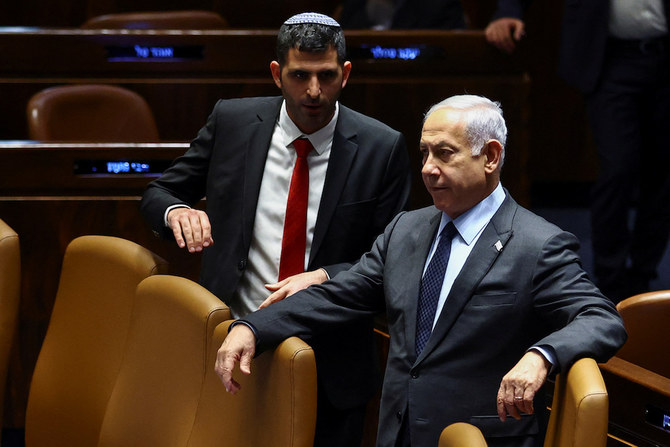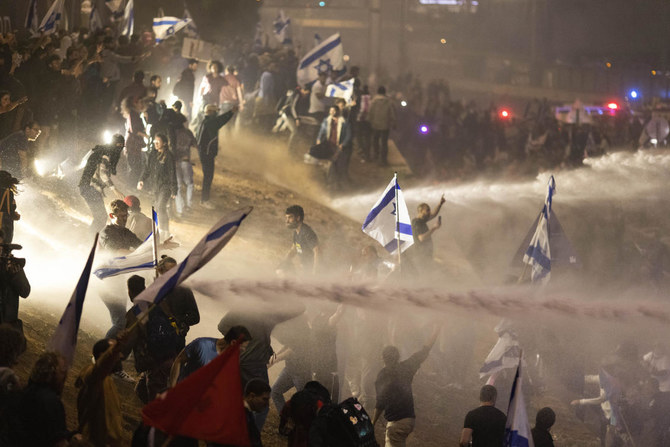RAMALLAH: Benjamin Netanyahu on Monday delayed controversial judicial reforms that have plunged Israel into chaos and that critics say are a power grab. The prime minister halted the legislation until parliament reconvenes on April 30.
“When there’s an opportunity to avoid civil war through dialogue, I, as prime minister, am taking a timeout for dialogue,” he said. Netanyahu added that he remained determined to enact the judicial reforms but called for “an attempt to achieve broad consensus.”
After the announcement, the head of Israel’s largest trade union called off a general strike that had threatened to bring Israel’s economy to a standstill. Earlier, tens of thousands of Israelis demonstrated outside the Knesset in a dramatic escalation of the mass protest movement aimed at halting the reforms.
The chaos shut down much of the country. Departing flights from the main international airport were grounded. Shopping malls and universities closed their doors, diplomats at foreign missions stopped work, and hospital medical staff offered only emergency services.
The growing resistance to Netanyahu’s plans came hours after tens of thousands of people burst onto streets around the country in a spontaneous show of anger at the prime minister’s decision to fire his defense minister, who had called for a pause to the overhaul. Chanting “the country is on fire,” they lit bonfires on Tel Aviv’s main highway, closing the road and many others throughout the country for hours.
Demonstrators gathered again on Monday outside the Knesset, turning the streets surrounding the building and the Supreme Court into a roiling sea of blue-and-white Israeli flags. Large demonstrations in Tel Aviv, Haifa and other cities drew thousands more.
“This is the last chance to stop this move into a dictatorship,” said Matityahu Sperber, 68, who joined a stream of people headed to the protest outside the Knesset. “I’m here for the fight to the end.”
Netanyahu’s U-turn appeared to ease tensions somewhat but organizers of the grassroots anti-government protest movement said a delay would not be enough.
“A temporary freeze does not suffice, and the national protests will continue to intensify until the law is rejected in the Knesset,” organizers said.
Israel’s Arab citizens have largely ignored the protests. They said Israel’s democracy is already tarnished by its military rule over the occupied West Bank and the discrimination they face inside Israel itself.
One senior Palestinian leader told Arab News: “I see our task as Palestinians being to deepen the crisis inside Israel, which means that we do not support the opposition against Netanyahu, but rather weaken both sides because they will compete over who can harm the Palestinians the most.
“The issue of reforming the judiciary is not an internal matter. Rather, its goal is to control the West Bank. They want to reform the High Court because it was a brake on their racist occupation policies against the Palestinians.”
With Israel in turmoil, Palestinians are watching and wondering how the chaos might affect them in the short and long terms. Some say the crisis has reinforced the awareness that democracy and occupation cannot coexist. Others suggest that the Israeli security services are so preoccupied with the demonstrations in Tel Aviv and Jerusalem, it could to some degree loosen their iron grip on Palestinians in the West Bank and East Jerusalem.
There is also a belief among some that the protests will weaken Israel, ultimately to the benefit of the Palestinian people. Most believe, however, that any attacks by Palestinian resistance fighters inside Israel at this time would serve only to benefit Netanyahu and his right-wing coalition government partners, led by Bezalel Smotrich and Itamar Ben-Gvir, by distracting from their political predicament.
Taysir Khaled, a member of the Palestine Liberation Organization’s Executive Committee, said the situation in Israel offers a valuable opportunity for Palestinians to adopt a fresh political approach and work to deepen Israel’s isolation, in the region and internationally, by highlighting the fact that Israeli policies of occupation, discrimination, apartheid and ethnic cleansing are incompatible with the basic values of democracy.
Though Palestinians have had limited success when pleading their cases at Israel’s Supreme Court, failing to prevent Israeli authorities from annexing more Palestinian land, should Netanyahu and his government ultimately succeed in effectively seizing control of the court, Palestinians would have no refuge at all, other than the International Court of Justice in the Hague.
Palestinian political analyst Ghassan Al-Khatib told Arab News that if the wave of Israeli protests against the government continues, it will weaken the Israeli right wing, which would serve the interests of the Palestinian people.
In the meantime, however, one of the effects of the protests has been the closure of the Allenby Bridge, the only land crossing connecting the West Bank with Jordan, as the result of a strike by Israeli customs officials. This has paralyzed commercial traffic between Palestine and Jordan and the movement of travelers to and from the West Bank.
Amid fears that Netanyahu’s government might take action in the West Bank or Gaza Strip in an attempt to provoke a Palestinian response that would unite left and right wingers be creating a security threat, analysts and experts told Arab News that they do not believe the leaders of the Israeli security services would comply with any such attempt to launch deliberately provocative attacks at this time.
Retired Col. David Hacham, a former adviser on Arab affairs to the Israeli Ministry of Defense, said that Netanyahu cannot currently launch a military campaign against the West Bank in an attempt to divert attention from his plight. If Hamas was to attack Tel Aviv and security becomes a priority, however, the differences between politicians of the left and right might be set aside, he added.
Dana Ben Shimon, a correspondent for the newspaper Israel Today, agreed with Hacham and said: “(Hezbollah leader) Hassan Nasrallah and (Hamas leader) Yahya Sinwar are looking at the current chaos in Israel and whispering, saying, ‘We will not give Netanyahu and his government the gift of attacking Israel — let them be torn apart and drown on their own.’”
Shawan Jabarin, director of Al-Haq, a human rights organization in Ramallah, told Arab News: “The Palestinians must link the crisis in Israel to the existence of the occupation, as there is no difference between right and left when it comes to the Palestinians.”
Mohammed Darawsheh, strategic director of the Givat Habiba Center and a political analyst who lives in Israel, told Arab News that Arabs in the country have not participated in the protests against the judicial reforms because “we do not trust the Supreme Court and we are not part of the patriotism of Israel to demonstrate under its flag.”
Palestinians in Israel said that the Israeli Supreme Court is relatively liberal on Arab civil issues but is still part of the deep state in terms of legitimizing racism toward Arabs and the occupation.
Darawsheh said that should the judicial reforms eventually be implemented, Arabs in Israel will be much worse off. Arab schools that teach their students about the Nakba, for example, would lose 30 percent of their funding, he said. It is also possible that Arab political parties could be banned from the Israeli parliament, and budgets for services that benefit Arab citizens could be cut and the money redirected to settlers and Orthodox Jews.
Arab leaders should organize their own parallel protests against the planned reforms, Darawsheh said, to increase the pressure on Netanyahu and his government “because giving up our rights without fighting a battle is a huge mistake.”





























